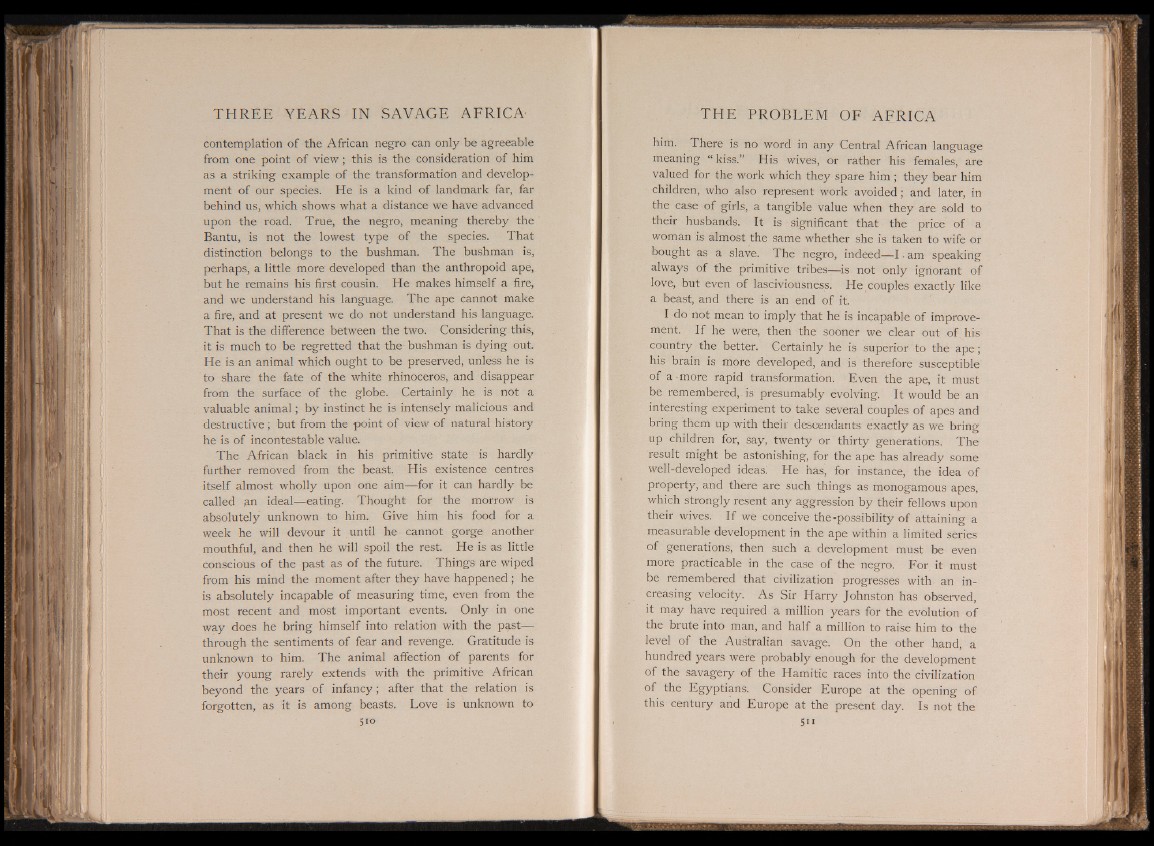
contemplation of the African negro can only be agreeable
from one point of view; this is the consideration of him
as a striking example of the transformation and development
of our species. He is a kind of landmark far, far
behind us, which shows what a distance we have advanced
upon the road. True, the negro, meaning thereby the
Bantu, is not the lowest type of the species. That
distinction belongs to the bushman. The bushman is,
perhaps, a little more developed than the anthropoid ape,
but he remains his first cousin. He makes himself a fire,
and we understand his language. The ape cannot make
a fire, and at present we do not understand his language.
That is the difference between the two. Considering this,
it is much to be regretted that the bushman is dying out.
He is an animal which ought to be preserved, unless he is
to share the fate of the white rhinoceros, and disappear
from the surface of the globe. Certainly he is not a
valuable animal; by instinct he is intensely malicious and
destructive; but from the point of view of natural history
he is of incontestable value.
The African black in his primitive state is hardly
further removed from the beast. His existence centres
itself almost wholly upon one aim—for it can hardly be
called an ideal—eating. Thought for the morrow is
absolutely unknown to him. Give him his food for a
week he will devour it until he cannot gorge another
mouthful, and then he will spoil the rest. He is as little
conscious of the past as of the future. Things are wiped
from his mind the moment after they have happened ; he
is absolutely incapable of measuring time, even from the
most recent and most important events. Only in one
way does he bring himself into relation with the past—
through the sentiments of fear and revenge. Gratitude is
unknown to him. The animal affection of parents for
their young rarely extends with the primitive African
beyond the years of infancy; after that the relation is
forgotten, as it is among beasts. Love is unknown to
510
him. There is no word in any Central African language
meaning “ kiss.” His wives, or rather his females, are
valued for the work which they spare him ; they bear him
children, who also represent work avoided ; and later, in
the case of girls, a tangible value when they are sold to
their husbands. It is significant that the price of a
woman is almost the same whether she is taken to wife or
bought as a slave. The negro, indeed—I . am speaking
always of the primitive tribes-—is not only ignorant of
love, but even of lasciviousness. He couples exactly like
a beast, and there is an end of it.
I do not mean to imply that he is incapable of improvement.
If he were, then the sooner we clear out of his
country the better. Certainly he is superior to the ape;
his brain is more developed, and is therefore susceptible
of a -more rapid transformation. Even the ape, it must
be remembered, is presumably evolving. It would be an
interesting experiment to take several couples of apes and
bring them up with their descendants exactly as we bring
up children for, say, twenty or thirty generations. The
result might be astonishing, for the ape has already some
well-developed ideas: He has, for instance, the idea of
property, and there are such things as monogamous apes,
which strongly resent any aggression by their fellows upon
their wives. If we conceive the-possibility of attaining a
measurable development in the ape within a limited series
of generations, then such a development must be even
more practicable in the case of the negro. For it must
be remembered that civilization progresses with an increasing
velocity. As Sir Harry Johnston has observed,
it may have required a million years for the evolution of
the brute into man, and half a million to raise him to the
level of the Australian savage. On the other hand, a
hundred years were probably enough for the development
of the savagery of the Hamitic races into the civilization
of the Egyptians. Consider Europe at the opening of
this century and Europe at the present day. Is not the
. 5ii